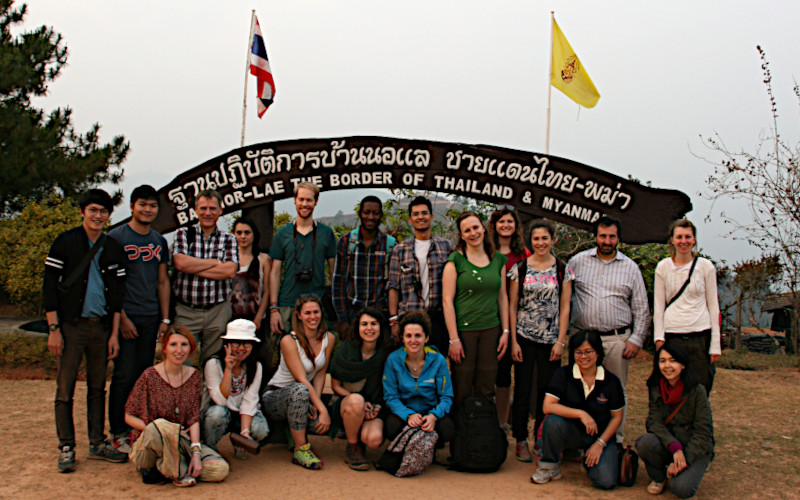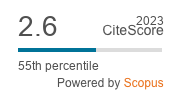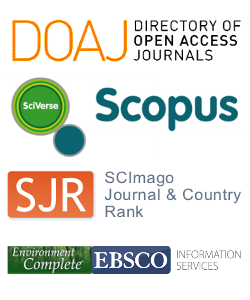Teaching applied landscape ecology in interdisciplinary and intercultural student groups. Experiences from a 10-years study abroad program
DOI:
https://doi.org/10.3097/LO.202081Keywords:
Dublin Descriptors, Exploratory Learning, Land Use, Restoration Ecology, Social SciencesAbstract
Against the background of the global environmental crises, landscape ecology and related disciplines become increasingly important. Higher education should therefore contribute to the development of experts and potential stakeholders who have not only scientific skills but also interdisciplinary, intercultural, and communication skills to be applied in diverse contexts throughout the world. A 10-years program, funded by the Stemmler Foundation within the German Stifterverband supported studies abroad with excursions, summer schools, and workshops with students from the Bachelor, Master and doctoral level of various study programs. Students from 39 countries from all over the world benefitted from this program. In summer schools, particularly ecosystem restoration and nature conservation were addressed in lectures and during field trips as well as with students’ input of case studies from their country of origin. During international excursions to various countries, land use and culture, land-use history, and sustainable development were topics, with close interaction with local land users and stakeholders. Bridging the natural with the social sciences was achieved by involving respective experts as well as stimulate students to cross-disciplinary thinking and judgements. Master students were offered exploratory learning environments abroad within ongoing landscape ecological research projects for their thesis. Students’ feedback reflect an overall successful approach, which prepared students for the global environmental challenges with hard and soft skills.
References
Ambraß, S., Radtke, A., Zerbe, S., Fontana, V., Ammer, C. 2014. Ausbreitung und Management von Götterbaum und Robinie in Niederwäldern - Erkenntnisse aus einer Fallstudie zu invasiven Baumarten in Südtirol. Naturschutz und Landschaftsplanung 46 (2), 45-51. ISSN 0940-6808.
Bologna Declaration 1999. Towards the European Higher European Area. Conference of Ministers responsible for Higher Education in 29 European countries. Bologna, Italy. Available in: http://www.ehea.info/media.ehea.info/file/Ministerial_conferences/02/8/1999_Bologna_Declaration_English_553028.pdf (Date: 06.06.2020).
Braga, M., Paccagnella, M., Pellizzari, M. 2014. Evaluating students’ evaluations of professors. Economics of Education Review 41, 71-88. DOI: 10.1016/j.econedurev.2014.04.002 DOI: https://doi.org/10.1016/j.econedurev.2014.04.002
Cardoso, A. R., Portela, M., Sá, C., Alexandre, F. 2007. Demand for higher education programs: the impact of the Bologna process. CESifo Working Paper 2081. Available in: https://www.econstor.eu/bitstream/10419/26126/1/555917681.PDF (Date: 06.06.2020).
Chiodo, E. 2013. Sustainable development in Higher Education in Europe: Good practices compendium. Ed. Homeless Book.
Council of Europe 2000. European Landscape Convention. European Treaty Series 176: 1-7.
Daily, G. C. 1995. Restoring value to the world‘s degraded lands. Science 269, 350-355. DOI: 10.1126/science.269.5222.350 DOI: https://doi.org/10.1126/science.269.5222.350
Davies, W. M. 2006. Intensive teaching formats: A review. Issues in Educational Research 16(1), 1-20. http://www.iier.org.au/iier16/davies.html
Dearborn, D. S. P., Bauer B. S. 2015. Inca astronomy and calendrics, in: Ruggles, C. (Ed.), Handbook of Archaeoastronomy and Ethnoastronomy. Springer, New York, pp. 831-838. DOI: https://doi.org/10.1007/978-1-4614-6141-8_78
ECA 2014. Dublin Descriptors. European Consortium for Accreditation. Available in: http://ecahe.eu/w/index.php/Dublin_Descriptors (Date: 08.06.2020)
ENQA 2009. Standards and guidelines for quality assurance in the European Higher Education Area. European Association for Quality Assurance in Higher Education, Helsinki, 3rd ed. Available in: https://enqa.eu/wp-content/uploads/2013/06/ESG_3edition-2.pdf (Date: 06.06.2020).
EUA 2020. Funding. European University Association. Available in: https://eua.eu/issues/18:funding.html (Date: 06.06.2020).
Ewing, A. M. 2012. Estimating the impact of relative expected grade on student evaluations of teachers. Economics of Education Review 31(1), 141-154. DOI: 10.1016/j.econedurev.2011.10.002 DOI: https://doi.org/10.1016/j.econedurev.2011.10.002
Fränzle, O. 2001. Alexander von Humboldt’s holistic world view and modern inter- and transdisciplinary ecological research. Northeastern Naturalist Special Issue 1, 57-90. https://www.jstor.org/stable/4130727 DOI: https://doi.org/10.1656/1092-6194(2001)8[57:AVHHWV]2.0.CO;2
Fry, H., Ketteridge, S., Marshall, S. (Eds.) 2009. A handbook for teaching and learning in Higher Education. Enhancing Academic Practice. 3rd ed., Routledge, New York. DOI: https://doi.org/10.4324/9780203891414
Gibbs, H. K., Salmon, J. M. 2015. Mapping the world's degraded lands. Applied Geography 57, 12-21. DOI: org/10.1016/j.apgeog.2014.11.024 DOI: https://doi.org/10.1016/j.apgeog.2014.11.024
Gogus, A., Arikan, H. 2008. Learning to learn in higher education. IADIS International Conference on Cognition and Exploratory Learning in Digital Age: pp. 278-284.
Hornstein, H. A. 2017. Student evaluations of teaching are an inadequate assessment tool for evaluating faculty performance. Cogent Education 4(1), 1-8. DOI: org/10.1080/2331186X.2017.1304 DOI: https://doi.org/10.1080/2331186X.2017.1304016
Jurasinski, G., Ahmad, S., Anadon-Rosell, A., Berendt, J., Beyer, F., Bill, R., Blume-Werry, G., Couwenberg, J., Günther, A., Joosten, H., Koebsch, F., Köhn, D., Koldrack, N., Kreyling, J., Leinweber, P., Lennartz, B., Liu, H., Michaelis, D., Mrotzek, A., Negassa, W., Schenk, S., Schmacka, F., Schwieger, S., Smiljanić, M., Tanneberger, F., Teuber, L., Urich, T., Wang, H., Weil, M., Wilmking, M., Zak, D., Wrage-Mönnig, N. 2020. From understanding to sustainable use of peatlands: The WETSCAPES approach. Soil Systems 4, 14. DOI: 10.3390/soilsystems4010014 DOI: https://doi.org/10.3390/soilsystems4010014
Keeling, R. 2006. The Bologna Process and the Lisbon Research Agenda: the European Commission’s expanding role in higher education discourse. European Journal of Education 41(2), 203-223. DOI: org/10.1111/j.1465-3435.2006.00256.x DOI: https://doi.org/10.1111/j.1465-3435.2006.00256.x
Klemenčič, M. 2019. 20 years of the Bologna Process in a global setting: the external dimension of the Bologna Process revisited. European Journal of Higher Education 9(1), 2-6. DOI: org/10.1080/21568235.2019.1570670 DOI: https://doi.org/10.1080/21568235.2019.1570670
Lakkala, M., Ilomäki, L., Mikkonen, P., Muukkonen, H., Toom, A. 2018. Evaluating the pedagogical quality of international summer courses in a university program. International Journal of Research Studies in Education 7(2), 89-104. DOI: 10.5861/ijrse.2017.1781 DOI: https://doi.org/10.5861/ijrse.2017.1781
Mayer, A.L., Buma, B., Davis, A., Gagné, S.A., Loudermilk, E.L., Scheller, R.M.,; Schmiegelow, F.K.A., Wiersma, Y.F., Franklin J. 2016. How landscape ecology informs global land-change science and policy. BioScience 66(6), 458-469. DOI: 10.1093/biosci/biw035 DOI: https://doi.org/10.1093/biosci/biw035
Michiko Hama, A., Seitz, M., Sansone A., Stötter J. 2005. An environmental education concept for Galtür, Austria. Journal of Geography in Higher Education 29(1), 61-77. DOI: org/10.1080/03098260500030371 DOI: https://doi.org/10.1080/03098260500030371
Mirschel, F., Zerbe, S., Jansen, F. 2011. Driving factors for natural tree rejuve¬nation in anthropogenic pine (Pinus sylvestris L.) forests of NE Germany. Forest Ecology Management 261, 683-694. DOI: 10.1016/j.foreco.2010.11.025 DOI: https://doi.org/10.1016/j.foreco.2010.11.025
Nagler, M., Fontana, V., Laira, G.J., Radtke, A., Tasser, E., Zerbe, S., Tappeiner, U. 2015. Different management of larch grasslands in the European Alps shows low impact on above- and belowground carbon stocks. Agriculture, Ecosystems and Environment 213, 186-193. DOI: 10.1016/j.agee.2015.08.005 DOI: https://doi.org/10.1016/j.agee.2015.08.005
Naveh, Z. 2007. Transdisciplinary challenges in landscape ecology and restoration ecology. An Anthology. Springer, Dordrecht. Landscape Series 6, 1-426.
Olsson, L., Barbosa, H., Bhadwal, S., Cowie, A., Delusca, K., Flores-Renteria, D., Hermans, K., Jobbagy, E., Kurz, W., Li, D., Sonwa, D.J., Stringer, L. 2019. Land degradation, in IPCC (Ed.), Climate Change and Land: an IPCC special report on climate change, desertification, land degradation, sustainable land management, food security, and greenhouse gas fluxes in terrestrial ecosystems. Available in: https://www.ipcc.ch/site/assets/uploads/2019/11/07_Chapter-4.pdf (Date: 06.06.2020).
Osei, R., Ansong, M., Zerbe, S. 2019. Comparison of socio-economic and ecologi¬cal benefits of bamboo and trees: the perspectives of local communities in south-western Ghana. Southern Forests, a Journal of Forest Science 81(3), 255-260. DOI: org/10.2989/20702620.2019.1581499 DOI: https://doi.org/10.2989/20702620.2019.1581499
Osei, R., Zerbe, S., Beckmann, V. 2018a. What tree species work best for reforesta-tion? Human perceptions and beliefs in Ghana's High Forest Zone. Small-scale Forestry 17, 243-258. DOI: 10.1007/s11842-017-9385-y DOI: https://doi.org/10.1007/s11842-017-9385-y
Osei, R., Zerbe, S., Beckmann, V., Boaitey, A. 2018b. Socio-economic deter¬minants of smallholder plantation sizes in Ghana and options to encourage reforesta¬tion. Southern Forests 81(1), 49-56. DOI: 10.2989/20702620.2018.1490992 DOI: https://doi.org/10.2989/20702620.2018.1490992
Ott, K. 2010. Umweltethik zur Einführung. Junius, Hamburg.
Ott, K., Dierks, J., Voget-Kleschin, L. (Eds.) 2017. Handbuch Umweltethik. J.B. Metzler, Stuttgart. DOI: https://doi.org/10.1007/978-3-476-05193-6
Potschin, M., Haines-Young, R. 2006. “Rio+10”, sustainability science and Landscape Ecology. Landscape and Urban Planning 75, 162-174. DOI: https://doi.org/10.1016/j.landurbplan.2005.03.005
Pruvot, E. B., Claeys-Kulik, A. L., Estermann, T. 2015. Strategies for efficient funding of universities in Europe, in: Curaj, A., Matei, L., Pricopie, R., Salmi, J., Scott, P. (Eds.), The European Higher Education Area. Springer, Cham: pp. 153-168. DOI: https://doi.org/10.1007/978-3-319-20877-0_11
Radtke, A., Ambraß, S., Zerbe, S., Tonon, G., Ammer, C. 2013. Traditional coppice forest management drives the invasion of Ailanthus altissima and Robinia pseudoacacia into deciduous forests. Forest Ecology and Management 291, 308-317. DOI: org/10.1016/j.foreco.2012.11.022 DOI: https://doi.org/10.1016/j.foreco.2012.11.022
Santos, A. V. dos, Guimarães-Iosif, R. M. 2013. The internationalization of Higher Education in Brazil: A marketing policy. Journal of Contemporary Issues in Education 8(1), 15-27. DOI: https://doi.org/10.20355/C59597 DOI: https://doi.org/10.20355/C59597
Skowronek, S., Terwei, A., Zerbe, S., Mölder, I., Annighöfer, P., Kawaletz, H., Ammer, C., Heilmeier, H. 2013. Regeneration potential of floodplain forests under the influence of nonnative tree species: Soil seed bank analysis in Northern Italy. Restoration Ecology 22(1), 22-30. DOI: org/10.1111/rec.12027| DOI: https://doi.org/10.1111/rec.12027
Succow, M., Joosten, H. 2001. Landschaftsökologische Moorkunde. 2nd ed., Schweizerbart‘sche Verlagsbuchhandlung, Stuttgart.
Tress, G., Tress, B., Fry, G. 2005. Clarifying integrative research concepts in landscape ecology. Landscape Ecology 20, 479-493. DOI: org/10.1007/s10980-004-3290-4 DOI: https://doi.org/10.1007/s10980-004-3290-4
UN 2020. Sustainable Development Goals. United Nations. Available in: https://www.un.org/sustainabledevelopment/ (Date: 06.06.2020).
Warden, R. 2018. Funding for Europe’s universities rising, but not enough. University World News. The Global Window on Higher Education. 20.10.2018. Available in: https://www.universityworldnews.com/post.php?story=20181020055821624 (Date: 06.06.2020 ).
Wihlborg, M., Friberg, E. 2016. Framework for a virtual nursing faculty and student learning collaboration between universities in Sweden and the United States: A theoretical paper. Nurse Education Today 41, 50-53. DOI: 10.1016/j.nedt.2016.03.012 DOI: https://doi.org/10.1016/j.nedt.2016.03.012
Wichtmann, W., Schröder, C., Joosten, H. (Eds) 2016. Paludiculture – productive use of wet peatlands. Climate protection – biodiversity – regional economic benefits. Schweizerbart Science Publishers, Stuttgart.
Willis, R., Curry P. 2020. Astrology, science and culture: Pulling down the moon. Routledge. DOI: https://doi.org/10.4324/9781003084723
Young, T. J., Handford, M., Schartner, A. 2016. The internationalising university: an intercultural endeavour? Journal of Multilingual and Multicultural Development 38, 189-191. DOI: org/10.1080/01434632.2015.1134547 DOI: https://doi.org/10.1080/01434632.2015.1134547
Zerbe, S. 2019. Renaturierung von Ökosystemen im Spannungsfeld von Mensch und Umwelt. Ein interdisziplinäres Fachbuch. Springer, Heidelberg. DOI: https://doi.org/10.1007/978-3-662-58650-1
Zerbe, S., Wiegleb, G (Eds.) 2009. Renaturierung von Ökosystemen in Mitteleuropa. Springer, Heidelberg. DOI: https://doi.org/10.1007/978-3-8274-2161-6

Downloads
Published
How to Cite
Issue
Section
Categories
License
Copyright (c) 2020 Stefan Zerbe

This work is licensed under a Creative Commons Attribution 4.0 International License.










